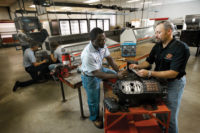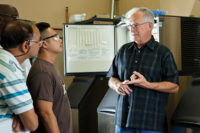
Jeff Sweda instructs students in the HVAC/plumbing shop at the Hazleton Area Career Center, Hazleton, Pa. Sweda is The NEWS’ 2010 Best Instructor.
When Jeff Sweda, HVAC and plumbing instructor, walks the halls of the Hazleton Area Career Center, he seems to know everyone by name. He nods at many of the students and jokes around with many others. It’s clear that he genuinely enjoys interacting with the 15- to 18-year-olds at the school, which is located in Hazleton, Pa.
Yet even as he jokes around and teases the students, Sweda also commands their respect. By the time they are seniors, many of them have figured out that Sweda is trying to teach them more than just a trade. He also wants to instill larger life lessons about self-discipline and respect.
According to one of his current students, senior Mike Kimmel, “Mr. Sweda is a very professional individual, and my classmates and I look up to him a lot.” Kimmel added, “He’s a big role model to us.”
AsThe NEWS’and Air Conditioning, Heating and Refrigeration Institute (AHRI) 2010 Best Instructor, Sweda goes above and beyond the classroom call of duty. Since he started teaching at the center 13 years ago, he has done an incredible amount of work to build the HVAC program and create opportunities for his students.
BUILDING THE PROGRAM
When Sweda began working at the career center, it only had a plumbing program. According to him, he has expanded the curriculum to include “a little bit of everything,” namely refrigeration, air conditioning, heating, and plumbing.The Hazleton Area Career Center offers a three-year program for students interested in learning a trade. When the sophomores join Sweda’s program, they learn the basics, such as safety practices, blueprint reading, basic tool use, and piping skills. When they enter their junior year, Sweda asks the students which field they want to focus on, and then guides them to projects in that path. By the time they’re seniors, Sweda said, “The projects get a little more complicated - setting up boilers, air conditioning units, furnaces, troubleshooting. They’ll know when they leave here how to reclaim a system, recover, vacuum, do some leak testing, charge a system, and do all of the piping necessary.”
Sweda is strict about participation in his class and shop. “The kids know that when you take my class, you have to work,” he said. “It’s not a blow-off class. It’s the real deal. They’re going to work. They’re going to write, they’re going to read, they’re going to do their math, and they’re going to work out in the shop.”
He has set these expectations because he knows his students’ ability to communicate will enable them to survive and thrive in the professional world. He requires all of his students to purchase and use a daily planner. Each time they come to his class, they have to write answers to review questions in their planners. Additionally, students must write down one thing they learned in class that day, which is called the “TOD” for “ticket out the door.” According to Sweda, they have to prove they learned something to get out the door at the end of class.
Yet he also tries to be creative “so the kids don’t know they’re learning” when they’re in the shop. For instance, he assigned his beginning students a project to spell their names in copper pipe. He constantly pushes them to perfect their projects, and willingly demonstrates how to do certain tasks when they don’t seem to be catching on.
“The one thing that Mr. Sweda has told me that I will never forget is to try your best,” said student Jared Baucum. “And if you don’t understand something, to ask it and he’ll show us how to do it.”

Sweda starts each class by requiring students to read and write in their daily planners. His goal is to teach them the communication skills that will be critical to their future success in the field.
DRAWING THEM IN
While developing the HVAC program, Sweda also became active in efforts to get more students interested in the trades. He’s worried about the stigma associated with votech schools. One of the problems he faces is trying to convince the people at the high school across the street to consider trade school. “This isn’t a dumping ground for dummies,” he said. “Our school is called a career center. We’re getting away from ‘votech.’ ”Sweda believes some popular TV trends are currently exposing more kids to HVAC, such as the HGTV network’s remodeling shows, and ABC’sExtreme Makeover: Home Edition. So he’s trying to capture and channel that interest toward careers in the trades.
This past February, Sweda spearheaded a local event to raise awareness of the trades. During Pennsylvania’s statewide vocational week, he organized an exhibit at the local mall. For three days, he had students bussed back and forth to the mall to showcase what they were learning and doing at the career center. His goal is to broaden young people’s minds to the opportunities in the trades.
“The potential is there and skilled workers are low,” he said. He also noted that with all of the advances in HVAC technology these days, “there’s a lot more on students’ plates” that will require them to be better educated.

Sweda covers air conditioning, heating, refrigeration, and plumbing in his courses. He urges his seniors to focus on a particular field and then assigns them more complicated projects.
COMPETING TO BRING OUT THE BEST
To keep his students involved in and excited about their education, Sweda takes them to competitions. This past May he took 10 students on an overnight trip to Rhode Island for a competition sponsored by the National Association of Oil Heat Service Managers (NAOHSM). The trip happened to fall on his 19th wedding anniversary. Thankfully, his wife, Jackie, understands and supports what he does for his students.Yet Sweda said other teachers tell him he’s crazy for risking an overnight outing. One of his colleagues, Bill Gerhard, has helped out by coming along to chaperone. Gerhard noted that Sweda is the only one “who can be bothered” to take the kids on these expeditions. Sweda also coordinates fundraisers to supplement the money the school provides for the trips.
According to Sweda, it’s worth the extra time, money, and effort. “Call me crazy, but it helps me for recruiting purposes and [getting the kids to] see what’s really out there,” he said.
All of the students who have been to competitions have great memories of the trips.
According to Nicco Maddon, a current student who went on the Rhode Island trip last year, “Mr. Sweda put us up in a real nice five-star hotel, he bought us dinner that night - everything.” Maddon said it was “a real nice time,” plus he and his fellow classmates came in first place out of the seven schools that participated.
After returning from competitions, Sweda said, “The kids are enthused because they’ve been exposed.” He added that the older students keep talking about their trips for weeks and weeks, and their enthusiasm spreads to the younger students.
There are clear criteria for who can attend a competition. To be eligible, students must have a B or above average, no more than seven absences, and no suspensions. This helps to keep students motivated and on their best behavior.

Students say that Sweda is willing to answer all their questions and show them how to do things the right way.
SUPPORT SYSTEM
Another reason Sweda attends competitions and shows is to network for program supporters. He has written a lot of letters to people he has met and asked for donations, and has been overwhelmed by the generous response from the industry.Sweda commemorates each donation with an engraved plaque next to the piece of equipment that names the donor. He can rattle off a list of manufacturers that have helped to support the program, including Weil-McLain, Beckett, and Carlin. Local contractors have also come to his aid, such as S.J. Kowalski Plumbing, Heating & Air Conditioning, which donated the only air conditioning unit currently in the shop.
Sweda also works closely with the National Association of Oil Heat Service Managers (NAOSHM). He said the association is behind him 100 percent and has provided many contacts and opportunities for his students.
LONG-TERM REWARDS
As he continues to build support for his program and draw in new recruits, Sweda is full of bigger plans for the future. One upcoming project will be to have his students install solar panels that will provide hot water for the school.And he intends to keep having fun while trying to inspire his students to make something of themselves. “There are a lot of good kids out there and everything gets overshadowed by one or two bad apples,” he said. “It always happens, and they forget about the good kids. I try to focus on the good kids, and try to change the bad apples into productive students.”
His hope and belief in his students’ ability to change keeps Sweda going. “In 10 years or five years down the road, when you see them out in public, you see what we have accomplished in education because these kids are productive citizens out in the real world.
“That’s what makes it all worthwhile.”
Sidebar: Work Ethic
Jeff Sweda stays busy long after the bell rings to let out his last class of the day. He has just returned as the school’s wrestling coach (after a nine-year hiatus to spend more time with his young daughter).Now he’s back and has invited many of his students to join the team. He firmly believes the discipline and work ethic taught in high school sports can make a difference in a young person’s life.
Additionally, Sweda both takes and teaches night classes. He has earned a bachelor’s in education from Temple University, a masters’ in curriculum development from Bloomsburg University, and is currently enrolled in the Directors of Vocational Education program at Temple University.
Sweda is also teaching an introductory course at Temple University for tradespeople who want to enter vocational education. Sweda took the course himself years ago, and now he teaches other trade experts how to write lesson plans and other essential skills for education. “We try to guide them and show them what to expect in the vocational trades,” he said.
Sweda attributes his continual desire and drive for achievement to “the two most important people” in his life: his wife, Jackie, and his daughter, Alyssa. “They help me stay grounded,” he said.
Publication date:11/08/2010







